Melvin M. Ragin, known professionally as "Wah Wah Watson", was an American guitarist who was a member of The Funk Brothers, the studio band for Motown Records.

Meshell Ndegeocello is a German-born American singer-songwriter, rapper, and bassist. She has gone by the name Meshell Suhaila Bashir-Shakur which is used as a writing credit on some of her later work. Her music incorporates a wide variety of influences, including funk, soul, jazz, hip hop, reggae and rock. She has received significant critical acclaim throughout her career, being nominated for eleven Grammy Awards, and winning one. She also has been credited for helping to "spark the neo-soul movement".
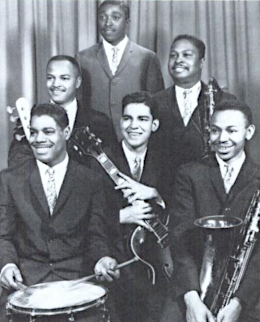
The Funk Brothers were a group of Detroit-based session musicians who performed the backing to most Motown recordings from 1959 until the company moved to Los Angeles in 1972.

James Lee Jamerson was an American bass player. He was the uncredited bassist on most of the Motown Records hits in the 1960s and early 1970s, and is now regarded as one of the most influential bass players in modern music history. He was inducted into the Rock and Roll Hall of Fame in 2000. As a session musician he played on twenty-three Billboard Hot 100 number-one hits, as well as fifty-six R&B number-one hits.
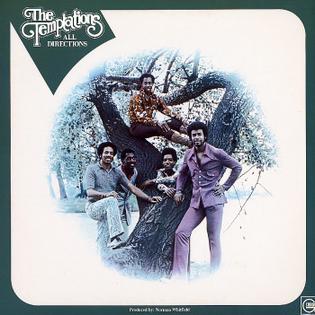
All Directions is a 1972 album by The Temptations for the Gordy (Motown) label, produced by Norman Whitfield. It reached number two on the Billboard 200, making it the band's most successful non-collaborative album on the chart, and became their twelfth album to reach number one on the Top R&B Albums chart.
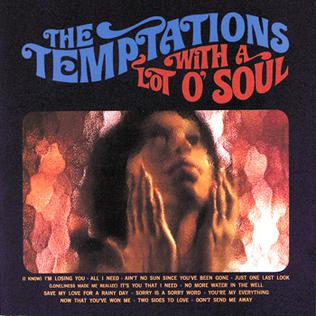
The Temptations with a Lot o' Soul is the fifth studio album by The Temptations for the Gordy (Motown) label released in 1967. Featuring four hit singles, With a Lot o' Soul is the most successful Temptations album from their "classic 5" era, during which David Ruffin, Eddie Kendricks, Paul Williams, Melvin Franklin, and Otis Williams constituted the Temptations' lineup.

Where Did Our Love Go is the second studio album by Motown singing group the Supremes, released in 1964. The album includes several of the group's singles and B-sides from 1963 and 1964. Included are the group's first Billboard Pop Singles number-one hits, "Where Did Our Love Go", "Baby Love", and "Come See About Me", as well as their first Top 40 hit, "When the Lovelight Starts Shining Through His Eyes", and the singles "A Breathtaking Guy" and "Run, Run, Run".
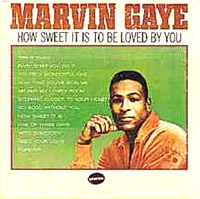
How Sweet It Is to Be Loved by You is the fifth studio album released by American singer and songwriter Marvin Gaye, released in 1965. The album features the successful title track, which at the time was his best-selling single and was famously covered by James Taylor in 1975. Other hits include "Try It Baby" and "Baby Don't You Do It" . Inspired by Jackie Gleason’s trademark expression.
"Quicksand" is a song recorded by the Motown girl group Martha and the Vandellas. It was written by the songwriting team of Holland-Dozier-Holland and released as a single in November 1963.
"In My Lonely Room" is a 1964 single by Motown girl group Martha and the Vandellas. In this song, which registered at #6 R&B (Cashbox) and #44 Pop, the narrator solemnly discusses how her lover's flirting with other girls leave her so depressed that all she can do was sit by "(her) lonely room and cry". The song was produced under a more solemn though still uptempo gospel-influenced number that had been on a number of the group's hits starting with "(Love Is Like a) Heat Wave". It was their fifth hit with Holland–Dozier–Holland.
"Wild One" is a dance single by Motown girl group Martha and the Vandellas. Written and produced by William "Mickey" Stevenson and Ivy Jo Hunter. The song was another Top 40 triumph for the group as it reached #34 on Billboard's Hot 100 singles chart and #11 on the Hot R&B singles chart. The backing track for 'Wild one' was an alternative version of the backing track to 'Dancing in the Street'.

Heat Wave is the second studio album released by American Motown girl group Martha and the Vandellas. Released in 1963 on Motown's Gordy imprint, intended to capitalize on the success of the title track, which rose to number four on the pop singles chart and number one on the R&B singles chart. The album was produced by Holland–Dozier–Holland and William "Mickey" Stevenson. This was the last album to feature original Vandella Annette Beard.

Dance Party is a 1965 studio album released by American Motown and soul girl group Martha and the Vandellas on the Gordy (Motown) label. The album was the group's third and, much like The Miracles' Mickey's Monkey album, mainly consisted of dance tunes. The singles featured on the album were their 1964 landmark single, "Dancing in the Street", their follow-up smash, "Wild One", and the hit "Nowhere to Run" and its b-side, "Motoring". The album was mostly produced by William "Mickey" Stevenson with several nods from Holland–Dozier–Holland.

Jack Ashford, known to his friends as Jashford, is an American musician widely known as the percussionist for Motown Records' in-house Funk Brothers band during the 1960s and early 1970s. Ashford is most famous for playing the tambourine on hundreds of Motown recordings. With the death of Joe Messina in April 2022, Ashford is the last surviving member of the Funk Brothers.

Joseph Edward Hunter was an American musician and keyboardist, known for his recording session work with Motown Records' in-house studio band, the Funk Brothers. One of the original Funk Brothers, Hunter served as band director from 1959 until 1964, when he left Motown and was replaced by Earl Van Dyke.
Dennis James Coffey is an American guitarist. He was a studio musician for many soul and R&B recordings, and is well known for his 1971 Top 10 hit single "Scorpio".

Epiphany: The Best of Chaka Khan, Vol. 1 is a compilation album of recordings by American R&B/funk singer Chaka Khan, first released on the Warner Bros. Records label in 1996. Although the compilation, which reached #22 on Billboard's R&B chart and #84 on Pop, was given the "Vol. 1" tag, it remains without a sequel to date.
Paul Riser is an American trombonist and Motown musical arranger who was responsible for co-writing and arranging dozens of top ten hit records. His legacy as one of the "Funk Brothers" is similar to that of most of the other "Brothers", as his career has been overlooked and overshadowed by the stars of Motown that became household names. Some of the Funk Brothers he worked with include: Earl Van Dyke, Johnny Griffith, Robert White, Eddie Willis, Joe Messina, Dennis Coffey, Wah Wah Watson, James Jamerson, Bob Babbitt, Eddie Watkins, Richard "Pistol" Allen, Uriel Jones, Andrew Smith, Jack Ashford, Valerie Simpson, Eddie "Bongo" Brown, Benny Benjamin, Cornelius Grant, Joe Hunter, Richard "Popcorn" Wylie, Marcus Belgrave, Teddy Buckner and Stevie Wonder.
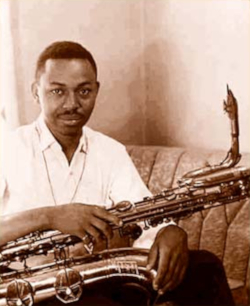
Andrew Alexander "Mike" Terry was an American saxophonist, songwriter, arranger, producer and musical director. His baritone sax solos feature on the breakthrough hits of Martha and the Vandellas, and The Supremes. As a member of the Funk Brothers he performed on thousands of Motown recordings from 1960 to 1967, including at least seven US #1 hits. As was Motown's policy at the time, none of the studio musicians were credited by name. Terry was the musical arranger of the 1966 hit "Cool Jerk" by The Capitols, and later became a record producer, with partners including George Clinton, Sidney Barnes, and Jack Ashford.
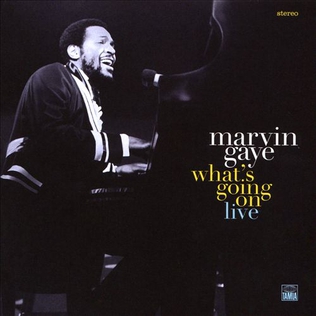
What's Going On Live is a live album recorded in 1972 by American soul singer Marvin Gaye and released posthumously in 2019 by Motown. The album documents a live performance of his album What's Going On and has received mixed feedback from critics.














